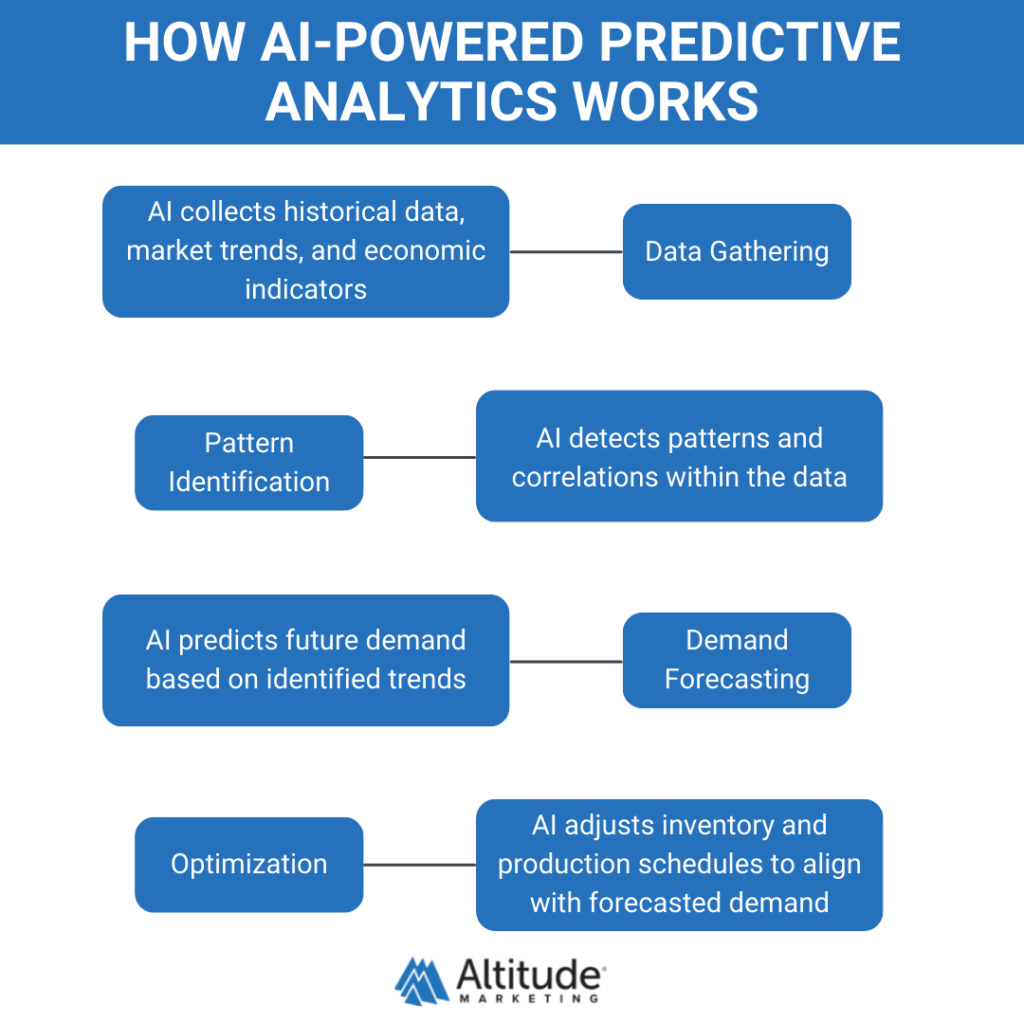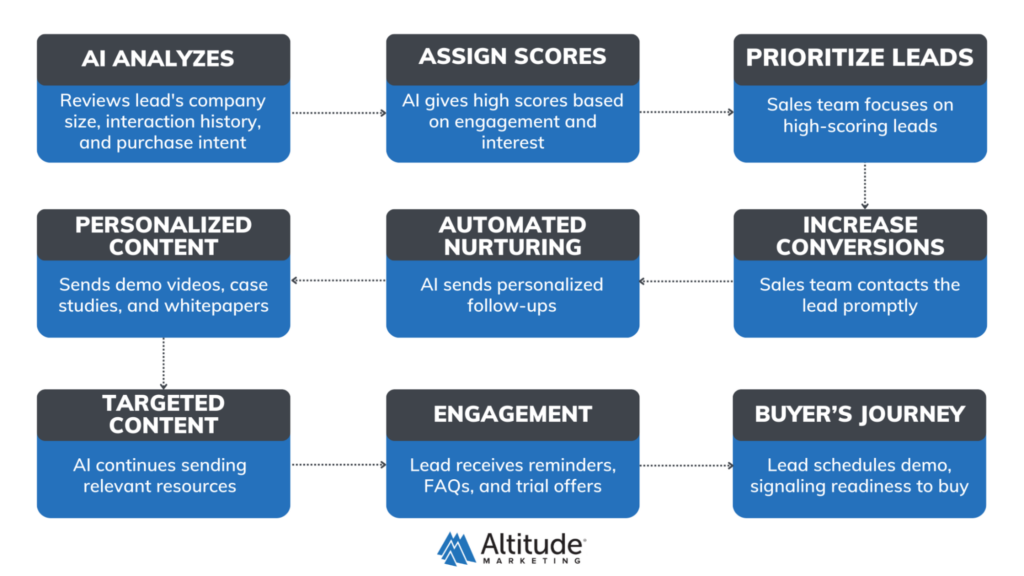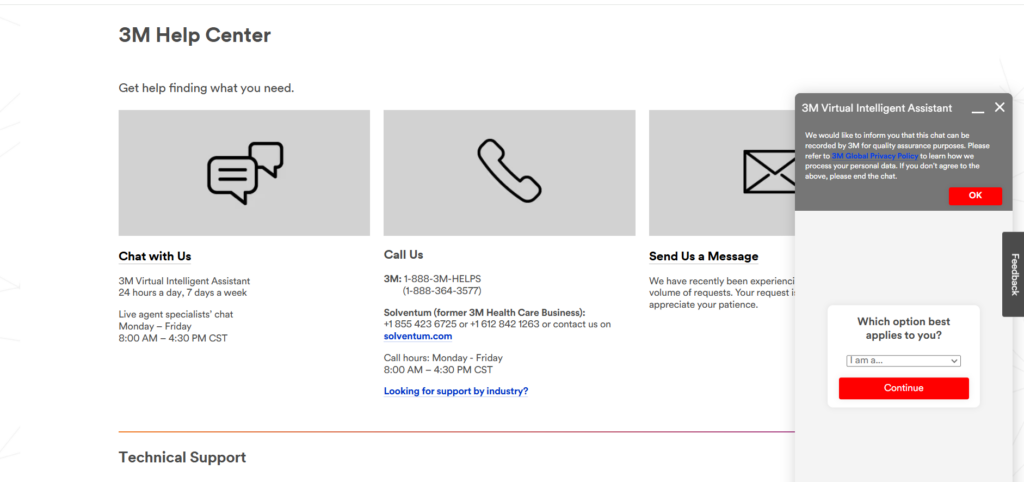Traditional manufacturing marketing has always emphasized technical reliability and relationships, but AI is enhancing it by introducing data-driven precision and efficiency. Did you know that 24% of businesses now use AI for audience segmentation? In the manufacturing sector, this trend is reshaping how companies target customers, deliver personalized messages, and optimize their marketing efforts.
From automating lead scoring to enhancing customer insights, modern AI-driven strategies are unlocking new possibilities in marketing for manufacturers. Here’s a closer look at how these strategies are making a difference, starting with predictive analytics for demand forecasting.

Exploring 12 AI Innovations in Manufacturing Marketing
1. Predictive Analytics for Demand Forecasting
AI-powered predictive analytics enables manufacturers to forecast demand with precision by analyzing historical data, seasonal trends, and even broader economic indicators. This helps businesses anticipate market needs and plan their operations effectively.
Inventory Optimization
Overstocking leads to wasted resources, while stockouts disrupt customer satisfaction. AI tackles this by analyzing demand data and maintaining ideal inventory levels, ensuring products are available when needed without overstocking warehouses.
Efficient Production Planning
With AI, manufacturers can optimize production schedules to match forecasted demand, reducing unnecessary costs and ensuring smooth operations. This results in minimized waste and improved resource utilization.

2. Enhanced Customer Insights and Segmentation
AI transforms customer data into actionable insights, helping manufacturers understand their audience’s needs, preferences, and behavior. This is crucial for effective marketing campaigns in the manufacturing sector.
Data Integration
AI collects and consolidates data from multiple sources, such as CRM systems, sales records, and customer interactions. This comprehensive view helps manufacturers make informed decisions about customer needs and behaviors.
Segmentation and Targeting
By analyzing this unified data, AI identifies distinct customer segments based on purchasing behavior, industry requirements, and business size. This allows manufacturers to target each segment with tailored marketing strategies.
3. Automated Lead Scoring and Nurturing
In the manufacturing industry, where the sales cycle is long and involves multiple touchpoints, AI streamlines lead management through automated scoring and nurturing strategies.
AI-Powered Lead Scoring
AI analyzes key attributes like company size, interaction history, and purchase intent to assign scores to leads. This allows sales teams to focus their efforts on high-value opportunities, increasing conversion rates.
Automated Lead Nurturing
AI enables personalized communication by delivering targeted content, such as product demos, technical whitepapers, or case studies. These touchpoints keep leads engaged and guide them through the buyer’s journey.
Here’s a flowchart illustrating how a software company uses AI-driven CRM to score and nurture leads effectively.

This is how a software company uses AI-driven CRM to efficiently score and nurture leads, guiding them through the buyer’s journey and ultimately converting them into customers.
4. Dynamic Pricing Models
Pricing in manufacturing is often subject to fluctuating material costs, changing demand, and competitor pricing. AI enables dynamic pricing, allowing real-time adjustments.
- Competitive Pricing: AI continuously monitors competitor pricing, ensuring your pricing stays competitive.
- Real-Time Adjustments: AI adjusts your pricing as soon as there are changes in material costs, demand, or market trends.
- Profit Maximization: AI helps you set prices that optimize profit margins while staying competitive.
- Customer Behavior Insights: AI analyzes customer buying patterns to adjust prices in a way that maximizes sales.
5. Content Personalization
AI-powered content personalization is a valuable tool in manufacturing, where customers seek specific, detailed information.
- Tailored Content Recommendations: AI uses customer data to suggest relevant case studies, whitepapers, or product details based on customer interests.
- Behavioral Analysis: AI analyzes customer interactions with content to refine content recommendations over time.
- Improved Engagement: Personalized content increases customer engagement by ensuring relevance to their specific needs.
- Customer Journey Mapping: AI can map customer journeys and provide content that addresses specific points in the buying process.
6. Chatbots for 24/7 Customer Service
AI chatbots are crucial for providing continuous customer support, answering frequently asked questions, and guiding customers to resources.
- Instant Answering: AI chatbots provide immediate responses to routine inquiries, improving customer satisfaction.
- Lead Qualification: Chatbots can qualify leads by asking initial questions and filtering out irrelevant inquiries before passing them to human agents.
- Automated Troubleshooting: AI chatbots can provide basic troubleshooting steps, reducing the workload for human agents.
- Global Support: AI chatbots ensure your customers, regardless of location, get timely responses, offering support 24/7.
7. Predictive Maintenance Marketing
AI allows manufacturers to anticipate when maintenance is needed for customer equipment, offering proactive solutions that drive customer satisfaction and reduce downtime.
Timely Alerts
AI can predict equipment maintenance needs by analyzing usage data and automatically sending alerts to customers. These timely notifications help customers prepare for maintenance before issues arise, reducing downtime and costly repairs by addressing potential failures early.
Proactive Marketing
Using AI’s predictive capabilities, manufacturers can offer service contracts, replacement parts, or upgrades just before maintenance is due. This proactive approach ensures that customers remain satisfied while creating new revenue opportunities, strengthening the manufacturer-customer relationship, and encouraging loyalty.
8. Sales Forecasting and Resource Allocation
AI helps manufacturers predict future sales, allowing them to allocate resources more effectively, optimize production, and improve ROI.
Accurate Forecasting
AI analyzes historical sales data, market trends, and external factors to accurately predict future sales. This insight helps manufacturers make informed decisions on production planning, inventory management, and marketing strategies, ensuring they are prepared for fluctuations in demand.
Better Resource Management
With AI-driven sales forecasting, manufacturers can optimize resource allocation. By focusing on high-performing regions, products, or sectors, companies can direct production, marketing, and workforce efforts where they are most needed, leading to more efficient operations and improved ROI.
Here’s how different types of AI-based sales forecasting methods help in optimizing resource allocation:
Type of Sales Forecasting | Description | How It Helps in Resource Allocation |
Time Series Forecasting | AI uses historical data to predict future sales trends. | Predicts demand patterns, guiding production schedules and inventory management. |
Causal Forecasting | AI incorporates external factors (e.g., market trends and economic shifts) to predict sales. | Helps adjust marketing and production strategies based on external influences. |
Predictive Analytics | AI analyzes various data points to predict future sales. | Focuses resources on high-potential regions, products, and market sectors. |
Opportunity Scoring | AI scores sales opportunities based on their likelihood to close. | Prioritizes high-value opportunities, enabling better allocation of sales efforts. |
Regression Analysis | AI identifies relationships between variables (e.g., promotions, seasonality) and sales. | Enhances forecasting accuracy, allowing for better resource distribution across operations. |
9. Enhanced Visual Recognition for Quality Control and Inspection
AI-driven image recognition helps manufacturers identify defects in products or packaging, improving quality control and boosting marketing efforts.
- Quality Assurance: AI can detect product defects early, ensuring only high-quality products reach customers, enhancing customer satisfaction, and providing a significant marketing advantage.
- Reduced Returns: By identifying defects before products are shipped, AI minimizes returns, boosting brand reputation and reducing the cost of returns.
- Improved Marketing: Highlighting the use of AI in quality control can be a strong marketing point, showcasing the manufacturer’s commitment to high standards and low defect rates.
10. Supply Chain Optimization and Sustainability Messaging
AI helps manufacturers optimize supply chains by reducing inefficiencies and minimizing environmental impact – an appealing message for eco-conscious clients.
Streamlined Processes
AI-driven insights help manufacturers improve various stages of their supply chain. By analyzing vast amounts of data, AI can identify bottlenecks, reduce waste, optimize procurement processes, and improve logistics, ensuring faster production cycles and cost reductions throughout the entire supply chain.
Sustainable Practices
AI helps manufacturers implement more sustainable practices by improving efficiency and minimizing environmental impact. Through data analysis, AI can reduce emissions, waste, and energy consumption, enabling companies to meet sustainability goals while promoting eco-friendly initiatives to attract environmentally conscious consumers.
11. Virtual and Augmented Reality (VR/AR) in Product Demonstrations
AI-powered VR and AR technologies enable manufacturers to showcase complex products in an immersive way, allowing potential customers to understand product capabilities fully.
- Interactive Demos: VR/AR offers 3D, interactive product demonstrations, enabling customers to engage with the product remotely and explore its features from every angle.
- Increased Engagement: Immersive VR/AR experiences hold customers’ attention longer than traditional methods like brochures or videos, leading to increased engagement and conversion rates.
- Customer Confidence: By using VR/AR to visualize how products will work in real-world settings, manufacturers can help customers make more informed purchasing decisions.
12. Improving SEO and Content Marketing with AI Insights
AI tools can optimize content for search engines by analyzing keyword trends and identifying high-impact topics in manufacturing.
Keyword Analysis
AI tools analyze keyword trends, search intent, and competitor strategies to identify the most impactful terms for your content. By targeting these keywords, manufacturers can create content that not only addresses audience needs but also ranks highly on search engines. This approach ensures better visibility and higher organic traffic.
Content Optimization
AI optimizes content for both readability and search engine ranking. It ensures that the language used is clear and engaging while also incorporating keywords and structure that improve SEO. This results in content that resonates with the audience and ranks higher in search results.
To further illustrate the power of AI in manufacturing marketing, here’s a breakdown of key AI technologies, their applications, and the specific benefits they bring to businesses looking to optimize their operations and marketing strategies.
AI Technology | Application in Manufacturing Marketing | Key Benefit |
Predictive Analytics | Forecasting demand and sales trends | Optimizes inventory and production planning |
Natural Language Processing (NLP) | Personalizing customer interactions in emails or chatbots | Enhances customer engagement and satisfaction |
Machine Learning | Analyzing historical data for lead scoring and segmentation | Improves targeting and campaign efficiency |
Computer Vision | Quality control in products and packaging | Demonstrates high standards in marketing |
Automating repetitive tasks like scheduling and follow-ups | Saves time and reduces manual effort | |
Virtual Reality (VR) | Interactive product demonstrations | Engages customers with immersive experiences |
Sentiment Analysis | Monitoring customer feedback and online reviews | Improves customer relationship management |
These AI technologies offer manufacturers practical solutions to improve their marketing strategies and optimize their operations, ultimately making their processes more efficient and customer-focused.
Master Manufacturing Marketing with These 12 AI Strategies
AI is helping manufacturers simplify processes, improve customer connections, and create smarter marketing strategies. By adopting tools for lead nurturing, personalized content, and efficient supply chain management, manufacturing companies can build stronger connections and adapt to changing market demands.
The key is to start small, focus on your business goals, and adopt AI as a practical solution to everyday challenges. With the right approach, AI can make manufacturing marketing more effective and impactful.
FAQs
How is AI used in marketing?
AI analyzes customer data, personalizes content, predicts trends, automates campaigns, optimizes ad placements, and provides real-time insights, enhancing decision-making and targeting precision in marketing strategies.
What is the best example of AI in marketing?
AI-powered chatbots, like those on e-commerce websites, deliver 24/7 customer support, answer queries, and recommend products based on user behavior, improving engagement and driving sales effectively.
What are the benefits of AI in marketing?
AI improves targeting accuracy, automates repetitive tasks, personalizes customer experiences, enhances campaign performance analysis, and reduces costs, enabling marketers to focus on strategy and creative initiatives.
What is the future of marketing with AI?
AI will enable hyper-personalized experiences, predictive analytics for better strategy planning, dynamic content generation, and real-time campaign optimization, making marketing more adaptive and customer-focused.
Can AI generate ads?
Yes, AI can create ads by analyzing audience data, generating copy, designing visuals, and optimizing placements, ensuring relevance and better engagement while saving time for marketers.
We help leading business-to-business brands hit their marketing goals. Get in touch to learn how Altitude Marketing can help you reach your peak performance.




